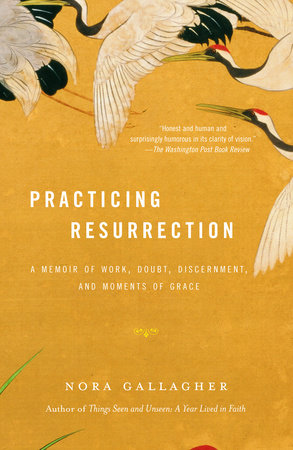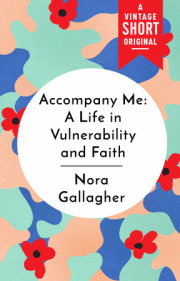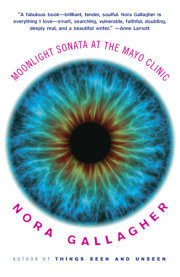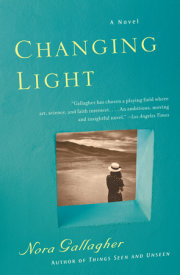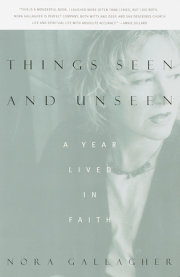I have a recurring dream in which I find, behind the familiar walls of my study or bedroom, another whole house. It is always much bigger and grander than the house I live in. Once its long windows looked out on fields of lavender in Provence. In the dream I think, Why didn’t I figure this out before? It’s simply a matter of finding a door.
I sat in church near the altar on a Thursday evening in April, waiting for it all to begin. Watery blue light fell from the high windows onto the fair linen, empty as a pocket. The altar was wooden and plain, ordered from a Lutheran catalog specializing in church furniture. The wine, shortly to sit on the altar in a little silver chalice that a priest found in a second-hand store, was cheap Christian Brothers cream sherry; the wafers were the whole wheat variety made by nuns in Clyde, Missouri. The table, the wine, the wafers were as everyday, as ordinary as my house, and also contained within and behind them a reality as complex, as beautiful, and as hidden as the house in my dream.
Prayers rose from the kneelers; I breathed in the stone-cooled air. In a few minutes, others arrived for this Thursday-evening service. An attorney for legal aid, an advocate for abused children, a heating serviceman, a realtor. Someone new, a woman with short reddish-brown hair wearing a cream-colored suit. They walked in from the street and stood in the cool dark, looking momentarily lost or disoriented, as if they had crossed a border and were in need of new currency, and then sat down.
Mark Asman, our parish priest, arrived last, in a black suit, clerical shirt, and collar. In Mark’s breast pocket was a small leather church calendar in which he kept, in a round, scrawled hand, dates for meetings on the pages marked with the names of martyrs and saints. On that calendar was a meeting on “human sexuality,” scheduled for June 11, a feast day for St. Barnabas, an apostle.
As Mark settled in, a stranger with dirty clothes and a stubbled chin walked unevenly into the church and sat down in a shadowed pew. He had “homeless” written all over him. Probably drunk. Mark motioned for him to come up to the altar area. He staggered slightly as he climbed the steps. When we stood for the Gospel reading, he reached for Mark’s hand and held onto it, his fingers knotted with Mark’s like lovers, for the rest of the service.
Ann Jaqua, a laywoman, gathered up her notes and headed for the lectern. The theme for her homily that night was “Mysticism 101.”
“Here at the end of the twentieth century, we have difficulty with anything that is neither apparent to the senses nor obvious to the intelligence,” Ann began. “We are caught in a restricted way of knowing that the scientific world has given us. And, as Huston Smith says, the scientific method only measures those aspects of reality we can control, leaving out all those aspects that are beyond our ability to control. All things that exceed us in freedom, intelligence, and purpose, things that cannot be pinned down.”
After the sermon and the peace, Anne Howard, the priest who was celebrating that night, held her palms over the bread and wine. She said, “Breathe on these bodily things.”
People asked for prayers: for my daughter who has eczema on her hands; in thanksgiving for my sister who, so far, is enduring chemo, her hair has not fallen out; I asked for prayers for the soul of my brother, Kit, and stood in their midst shaking with tears. They held their palms like light wings over my back and shoulders. Anne rubbed oil that smelled of rosemary into my forehead, and made the sign of the cross. Breathe on us.
When Anne raised her hand to bless us at the end of the service, the drunk raised his hand, too, and, right along with her, made the sign of the cross over us all. We were there, empty as the altar, becoming flesh.
When my husband, Vincent, and I came home from New Mexico after Kit’s death, cards from the people at church were stacked up on the white table next to our front door like leaves on a lawn. Mark Benson, who served on my discernment committee, read a verse from Dr. Seuss into the answering machine and I scribbled it on a scrap of paper from my brother’s house: “ ‘The storm starts when the drops start dropping. When the drops stop dropping, then the storm starts stopping.’ It feels to me like what grief is like.”
Outside, green lawns and ivy, fields of yellow mustard, wild lilac loosed on the hills, palm trees, and beach sand. It was not like New Mexico where Kit and I grew up and where I had just left his ashes. In New Mexico dark mesas rise off the desert floor, heart-shaped leaves of cottonwoods dance by the river, orchards are fed by each village’s acequia madre, the mother ditch.
I dreamed of a piece of pottery I found on land I own near Santa Fe. It was colored gray, like ashes, and had the remains of a design on it, a black V. I thought of the people who had made that jar, walking, then falling, their bones intertwined in the roots of the sagebrush under my feet, and then I put it back where I had found it, in a streambed fed by summer rains.
A bouquet of flowers arrived from the monks at Mt. Calvary monastery. The card read, “With love from your brothers.”
Vincent and I couldn’t do simple things. We couldn’t go to the grocery store or cook dinner. On our first night back, an insulated carry-all appeared on the front porch, left there by Dodie Little, from Trinity. Inside was a cooked chicken, potato salad, green beans, and brownies. I realized that had she not brought it to us, we would not have eaten.
In the week ahead, I could hardly bear to be in church. I couldn’t be in large rooms or with many people at once. I suffocated on the living. I believed no one noticed, until Mark Asman took me aside and said, “Are you having trouble with crowds since Kit died?”
I felt as if I was wandering around in a newly discovered archeological dig where there are pieces of things all over the ground—pottery shards, abandoned campsites, and bones—and that someday someone would come along and make sense of them.
I would be watering the garden or opening an envelope and Kit’s death would spring on me completely new and jolting, as if I’d been hit hard from behind with no warning, and I then would fold up, like a fan.
Parts of my life, the life I led before Kit grew sick and died, no longer made sense. A life of meetings, stretched between appointments, always ten minutes late. Half listening to people. A life dictated by clocks and money and computers and cars, without hawks and lakes and wild roses, a world increasingly without surprise or humor. I thought of how we as a species have endangered not only animals and plants around us, but the wild nature of our own lives. We have fabricated this world, to paraphrase the writer Philip Sherrard, and our punishment is that we have to adapt to it.
I half realized, as I stood in the wreckage of my brother’s death, that I had lost more than Kit; I’d lost my own wild life, I’d lost the sacred in the world. By the life I was leading, I had lost much of the holy, and my job now, if one could call it a job, was to find it again but in a different place.
I thought of a story about Dan Corrigan, a retired Episcopal bishop. Dan was famous in the church for breaking rules. He had been arrested during the Vietnam War for saying Mass on the Pentagon steps, had advocated the ordination of homosexuals in the fifties, and had been nearly shot by a Mississippi state trooper when he went down to speak of civil rights at a black college in 1952. He and other bishops and priests spoke for the ordination of women to the priesthood from the late sixties onward, but the national church’s governing bodies did not act. In 1974, after much deliberation, conversation, and prayer, he and two other bishops stepped into the breach and ordained eleven women to the Episcopal priesthood in Philadelphia, without benefit of church permission, risking censure and revocation of their licenses to preach and preside. Dan was in his eighties at the time.
Anne Howard was saying goodbye to Dan one day up at the monastery.
“Take care of yourself, Dan,” said Anne, turning to walk out the door.
Dan stopped, and said, “No, I don’t think so.”
“I beg your pardon?” Anne asked.
“I don’t take care of myself,” Dan replied. “I spend myself.”
I felt an urgency to reclaim the holy in my life, to find a new way to spend myself. Kit’s death gave that desire weight, a kind of gravity. His death and its aftermath were benchmarks against which I measured the clarity or falsehood of my next steps, the next path.
And thus I set out to do something new as a way to come to myself, a new way to spend myself.
Since Kit’s death, I have been visited—there is no other word for it—by birds. Driving north on Highway 101, a red-tailed hawk flies low over the hood of my car, so close I can see the black bead of his eye. Sitting in a garden of a retreat house near Malibu, the wide Pacific Ocean spread before me, a hummingbird zips to within a foot of my face. The day of Kit’s death, I found myself, without knowing how I got there, standing in the midst of a bird refuge near his house, listening to the ducks in the rushes and millet, and watching the movement of wind on the water. I could not make sense of these events, but they had the quality of something larger, or deeper, Simone Weil’s “events of a different order.” They, too, counted in my next decision, although I did not know how or why.
In the midst of this year of discernment, as I sat with those four people, four other souls, for three hours once a month and listened for the word of God that was often like the sound of wind, or the motion of birds, I knew that Kit’s death echoed into this. His death had a wake, the way everything has a sound.
It started for me as a series of dreams. In each of them, I served the Eucharist bread, the bread or wafers that can be blessed only by a priest. (A priest consecrates the bread, but this consecra- tion can’t be done alone. The Eucharist must be celebrated in community.)
I was never inside a church, I was always walking outside, sometimes in the countryside, sometimes in city streets. Once, I served rice. A few grains in my palm became a never-ending supply, a fine puffy mound, as long as I gave it away. I served it to groups of people standing on the street. As I lifted my palm to a woman dressed in a neat black suit, diamond earrings, and a red fox coat and offered, politely, “The Body of Christ?” she said, “Oh, yes, I could use that.”
In one dream, I sifted through a covered tray for bits of bread to serve. The tray was like one my mother used at cocktail parties to collect ashes and cigarette butts. I had to be careful to distinguish between the wafers and the trash. It was very important to get everyone fed, and on the right food. In another, I held Jesus’ coat. In yet a third, Nelson Mandela, who was giving the homily at Trinity, for some dream-like reason, turned to me and said, “And when are we going to get you preaching?”
Whatever it was, it did not go away. Mark Benson sent me a card with a medieval woodcut of a shepherd carrying a particularly nasty-looking child on his shoulders up a steep canyon, with the inscription, “Get off my back, Jesus.” Inside Mark wrote, “Is the Hound of Heaven hounding you?”
Any person serious about her faith has probably looked up from pew or chair and thought, I wonder what it’s like to be . . . up there? To dedicate one’s life to the celebration at the altar, to be at the heart of life-changing events of people’s lives, to make a difference. To go all the way. Not to mention getting focused attention, wielding power, and wearing those great clothes. And also—I would learn much more about this over the next three years—after you’ve been a member of a faith community for some time, you begin to wonder, Isn’t there something besides sitting down, standing up, and singing? Isn’t there anything more?
I sought what Ann Jaqua calls my true self, or some kind of completion. I feared what Rilke called the “repository of unlived lives.” I knew I wanted to do this with my community and in my community. I did not want to be the Lone Ranger.
Copyright © 2003 by Nora Gallagher. All rights reserved. No part of this excerpt may be reproduced or reprinted without permission in writing from the publisher.

